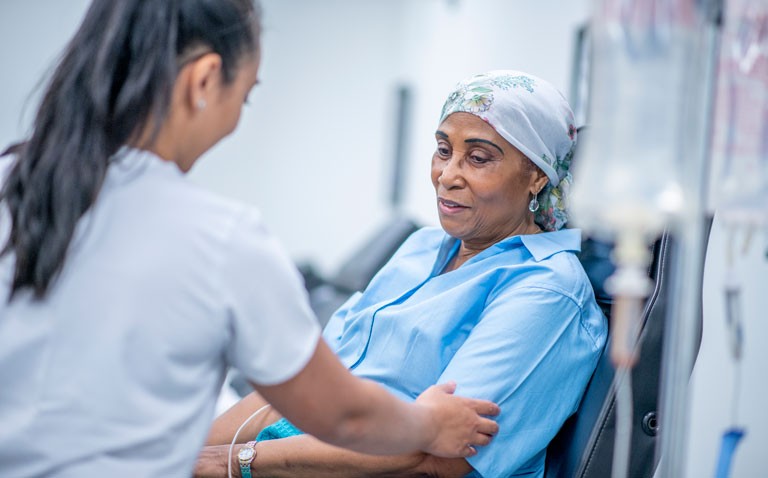Adjuvant pembrolizumab in addition to chemotherapy has been found to improve event-free survival in triple negative breast cancer patients
Adjuvant pembrolizumab added to chemotherapy post surgery significantly improves event-free survival compared to chemotherapy alone. This was the conclusion of a study by researchers from the Centre of Experimental Cancer Medicine, Barts Cancer Institute, London, UK.
Triple negative breast cancer constitutes 10-15% of female breast cancers and is a more aggressive cancer with more frequent recurrence and worse survival compared with the non-triple negative form.
Clinical trial data has revealed improved disease-free survival with postoperative chemotherapy in patients with either triple-negative or HER2-positive breast cancer who had residual disease after neoadjuvant chemotherapy.
Whether the addition of pembrolizumab to neoadjuvant chemotherapy would increase the proportion of patients with early triple-negative breast cancer who had a pathological complete response after surgery was unclear until publication in 2020, of the KEYNOTE-522 trial.
The trial concluded that the percentage of patients with a pathological complete response was significantly higher among those who received pembrolizumab plus neoadjuvant chemotherapy than among those who received placebo plus neoadjuvant chemotherapy.
For the present study, the authors have reported on an updated analysis of the KEYNOTE-522 trial and in particular, event-free survival as well as additional efficacy and updated safety information. Participants were adults with confirmed triple negative breast cancer or those with newly diagnosed and previously untreated non-metastatic disease with primary tumour and regional lymph node involvement.
During the adjuvant phase, patients with previously untreated stage II or III triple negative breast cancer, were randomised 2:1 to receive either pembrolizumab (the pembrolizumab–chemotherapy group) or placebo (the placebo–chemotherapy group), administered once every 3 weeks.
After surgery, patients received either pembrolizumab or placebo and chemotherapy every 3 weeks for up to nine cycles. The primary endpoint was pathological complete response and event-free survival.
Adjuvant pembrolizumab and event-free survival
A total of 1174 patients were randomly assigned to either arm and during follow-up, 123 (15.7%) patients assigned to the pembrolizumab arm had an event or died compared to 93 (23.8%) in the placebo-chemotherapy arm.
The estimated event-free survival after 36 months was 84.5% in the adjuvant pembrolizumab group and 76.8% in the placebo arm, giving a hazard ratio, HR, for an event or death = 0.63, 95% CI 0.48 – 0.82, p < 0.001.
Data on overall survival were described as immature at the time of the analysis and the estimated overall survival at 36 months was 89.7% in the adjuvant pembrolizumab group and 86.9% in the placebo-chemotherapy group. With respect to safety, the authors reported that the reported adverse events were consistent with the established safety profile of both pembrolizumab and chemotherapy.
The authors concluded that among those with early triple negative breast cancer, neoadjuvant pembrolizumab plus chemotherapy and then followed by adjuvant pembrolizumab after surgery, was associated with a significantly longer event-free survival than neoadjuvant chemotherapy alone.
Citation
Schmid P et al. Event-free Survival with Pembrolizumab in Early Triple-Negative Breast Cancer N Engl J Med 2022










